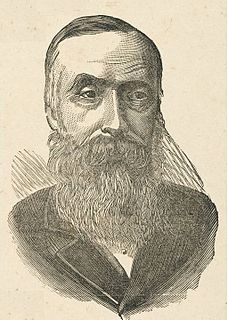Related Research Articles

Otago Harbour is the natural harbour of Dunedin, New Zealand, consisting of a long, much-indented stretch of generally navigable water separating the Otago Peninsula from the mainland. They join at its southwest end, 21 km (13 mi) from the harbour mouth. It is home to Dunedin's two port facilities, Port Chalmers and at Dunedin's wharf. The harbour has been of significant economic importance for approximately 700 years, as a sheltered harbor and fishery, then deep water port.

Dunedin is the second-largest city in the South Island of New Zealand, and the principal city of the Otago region. Its name comes from Dùn Èideann, the Scottish Gaelic name for Edinburgh, the capital of Scotland.

John Cargill was a New Zealand politician and runholder.

Port Chalmers is a suburb and the main port of the city of Dunedin, New Zealand, with a population of 3,000. Port Chalmers lies ten kilometres inside Otago Harbour, some 15 kilometres northeast of Dunedin's city centre.

William Walter Cargill was the founder of the Otago settlement in New Zealand, after serving as an officer in the British Army. He was a member of parliament and Otago's first Superintendent.

John Wickliffe was the first ship to arrive carrying Scottish settlers, including Otago settlement founder Captain William Cargill, in the city of Dunedin, New Zealand. The ship was named after a religious reformer, John Wycliffe.

The villages and then city that lay at the head of Otago Harbor never existed in isolation, but have always been a staging ground between inland Otago and the wider world. While Dunedin's current official city limits extend north to Waikouaiti, inland to Middlemarch and south to the Taieri River mouth, this articles focus is the history of the Dunedin urban area, only mentioning Mosgiel, the Otago Peninsula, Port Chalmers and inland Otago for context.

Thomas Burns was a prominent early European settler and religious leader of the province of Otago, New Zealand.
The following lists events that happened during 1848 in New Zealand.

Thomas Dick was a 19th-century New Zealand politician. Originally a merchant, he worked in London and then represented his firm on Saint Helena for seven years. From there, he was sent to Dunedin as the company's representative; he emigrated with an extended family. He soon became involved in politics and was Superintendent of Otago Province from 1865 until 1867. Over a period of 24 years, he represented various Dunedin electorates in Parliament and was Colonial Secretary (1880–1884), Minister of Justice from 1881 to 1882, and Minister of Education from 1881 to 1884. A deeply religious man, he was involved in many church affairs. He was one of the founders of Hanover Street Baptist Church; the building is now classified as Category I by Heritage New Zealand.
Scottish New Zealanders are New Zealanders of Scottish ancestry or who originate from Scotland.
Edward McGlashan was a 19th-century Member of Parliament in Dunedin, Otago, New Zealand.
George Hepburn was a 19th-century Member of Parliament from Otago, New Zealand. Born in Scotland he emigrated to New Zealand in 1850. He first entered politics by serving on the Provincial Council of Otago from 1855 to 1865 before he was elected to the New Zealand House of Representatives as member for Roslyn in 1866.

John Hyde Harris was a 19th-century New Zealand politician. Born in England, he came to Dunedin as a young man and practised as a lawyer, and was then a judge. He entered provincial politics and was elected as the fourth Superintendent of the Otago Province. He then became Mayor of Dunedin and was called to the Legislative Council.
John McGlashan was a New Zealand lawyer, politician, public servant and educationalist.
Philip Laing is a 19th-century sailing ship best known as the second immigrant ship to arrive in Dunedin, New Zealand, on 15 April 1848. Chartered by the New Zealand Company for this voyage the ship was carrying Scottish settlers, under the charge of the Rev. Dr. Thomas Burns.
Events from the year 1848 in Scotland.

Joseph Braithwaite was a New Zealand bookseller and politician. He was mayor of Dunedin from 1905 to 1906.
William Bannerman was a pioneering Presbyterian minister in Otago, New Zealand.
Isabella Anderson was a New Zealand pioneer. She gave birth to the first Pakeha child born in Dunedin.
References
- ↑ Henare, Amiria (2005). Museums, Anthropology and Imperial Exchange. Cambridge University Press. pp. 138–140. ISBN 0521835917.
- ↑ Breward, Ian. "John McGlashan". Dictionary of New Zealand Biography . Ministry for Culture and Heritage . Retrieved December 2011.Check date values in:
|access-date=(help) - ↑ "1848: The John Wickliffe anchors at Port Chalmers". New Zealand History Online. New Zealand Ministry for Culture and Heritage. Retrieved 7 April 2014.
- ↑ "The Otago settlement". Te Ara: The Encyclopedia of New Zealand . Ministry for Culture and Heritage of the New Zealand Government . Retrieved 7 April 2014.
| This New Zealand–related article is a stub. You can help Wikipedia by expanding it. |